Kingfishers are breathtaking birds which have come to represent the natural beauty of wetlands, marshes, rivers, and lakes. They are unique in appearance, with their large heads and long thick bills which are perfectly adapted for snapping up fish from the water. The kingfisher seems to have a nearly universal ability to inspire awe and admiration. From ancient Egypt to biblical legends, from the Native Americans to the ancient Greeks, the kingfisher is the subject of a wealth of art and storytelling.
Most frequently associated with idyllic nostalgia via the idiom “Halcyon Days,” the kingfisher is an overwhelmingly positive symbol. In almost every tradition, this bird indicates beauty, virtue, and good things to come.
Kingfisher Symbolism and Meaning
Kingfishers are often used as emblems of the beauty of wetlands. These birds are aptly named, and spend much of their time perched just above the water, waiting for the moment to dive and catch an unsuspecting fish with their powerful spear-like bills.
Because of this behavior, kingfishers are often associated with the hobby and occupation of fishing. Anglers often feel a sense of kindred connection to the kingfisher.
Additionally, the way that kingfishers hunt associates them with serenity and stillness. This symbolism is reinforced by the concept of “Halcyon Days.” This refers to calm fair weather and is connected to the kingfisher via a particular episode from Greek mythology.
Kingfisher Native American Symbolism
Native American symbolism associates the kingfisher with powerful magic and shamanic healing. Additionally, kingfishers are sometimes thought of as messengers.
Kingfisher Christianity Symbolism
Christian symbolism connects the kingfisher with forgetfulness and atonement. This is due to a legend which claims that the kingfisher was amongst the first birds to be released from Noah’s ark, but that the kingfisher let Noah down. We’ll look at this story in detail in the mythology section of this article!
Kingfisher Celtic Symbolism
Celtic symbolism connects the kingfisher to serenity, patience, and the vibrant beauty of nature. The way that kingfishers wait for their prey alongside ponds and streams evokes a sense of tranquility and watchfulness. The Welsh poet William Henry Davies wrote of the kingfisher in his 1910 poem of the same name:
“It was the Rainbow gave thee birth,
And left thee all her lovely hues;
And, as her mother’s name was Tears,
So runs it in my blood to choose
For haunts the lonely pools, and keep
In company with trees that weep.
Go you and, with such glorious hues,
Live with proud peacocks in green parks;
On lawns as smooth as shining glass,
Let every feather show its marks;
Get thee on boughs and clap thy wings
Before the windows of proud kings.
Nay, lovely Bird, thou art not vain;
Thou hast no proud, ambitious mind;
I also love a quiet place
That’s green, away from all mankind;
A lonely pool, and let a tree
Sigh with her bosom over me” (1)
Kingfisher in Dreams
Dreaming of a kingfisher is largely a positive experience which indicates the start of a peaceful or joyous period in one’s life. A kingfisher’s appearance in a dream may mean that you have entered a period of rest or calm, and that you should take this time to renew yourself and acknowledge your blessings with gratitude.
A kingfisher dream may also indicate longing. It may be a sign that your energy is too focused on something unattainable. Be especially cautious about nostalgia. The past is perhaps the most unattainable object of all; you can only move forward.
Kingfisher Encounters and Omens
An encounter with a kingfisher is often a sign that you need to slow down and exercise some patience. Kingfishers are the ultimate stoics, placidly surveying the water below for as long as it takes. If you encounter a kingfisher, it may mean that you must wait in order to achieve your goal.
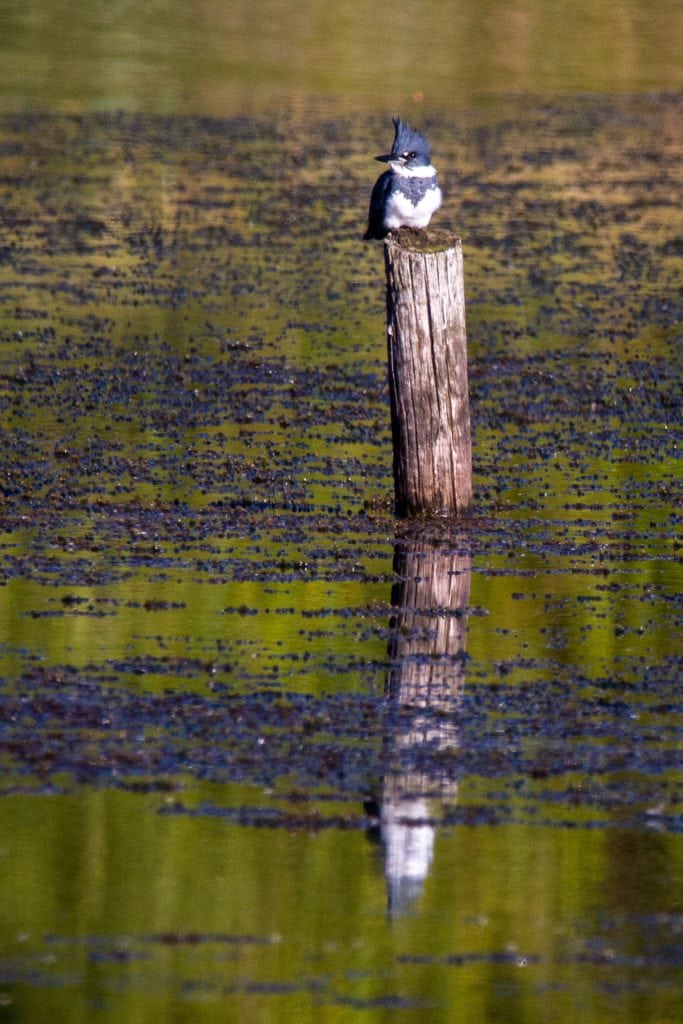
Additionally, a kingfisher encounter may be an invitation to stop and smell the roses. Do your best to enjoy the present without fixating on a singular goal or desire. Nature’s beauty is all around us and it never costs a dime. The kingfisher reminds us to be grateful for what we have and for all of the amazing things that we have the opportunity to experience each day.
Kingfisher in Mythology & Folklore
Kingfishers feature prominently in a number of myths and stories. Below are some of the most fascinating examples of kingfisher myths and fairytales, as well as examples of the ways that kingfishers are important to various cultures.
Native American Mythology:
One Achomawi Native American myth describes the kingfisher as a powerful shaman. In this story, the daughter of the sun is kidnapped and hidden beneath the mud in the river. For an entire day, all the men and animals under the sun searched river for her, but could not find her. The kingfisher was the last to search. He blew his tobacco pipe across the water, using his magic to make the water clear. Once the water was clear, the kingfisher speared a basket, inside of which the maiden had been hidden. He pulled her from the water and returned her to her father, the sun. (2)
Christian/Jewish Mythology:
A Christian legend places the kingfisher within the story of Noah’s ark. This legend states that the kingfisher was once a drab grey bird. The kingfisher, along with the other fauna of the world, was brought onto Noah’s ark before the great flood arrived. After floating in the ark for many many days, Noah sent the dove to find a sign of dry land. The dove brought back a branch. After a while, Noah sent the dove once more, but this time the dove found a place to live on the land, and it did not return. So, Noah sent another bird to confirm that the land was dry.
This was the kingfisher. When the kingfisher was set free from the ark, it was so overjoyed to be in the sky that it flew up high into the blue expanse, turning its feathers blue. Then, delighted to have the sun on its belly, the kingfisher looped across the sky and the sunlight turned its belly a fiery orange color. The kingfisher was so filled with joy that it forgot to return to the ark until long after Noah and the other animals had departed. Consumed with guilt, the kingfisher stares into the water of lakes and streams to this day, hoping to see the ark floating along so that it may make amends to Noah. (3)
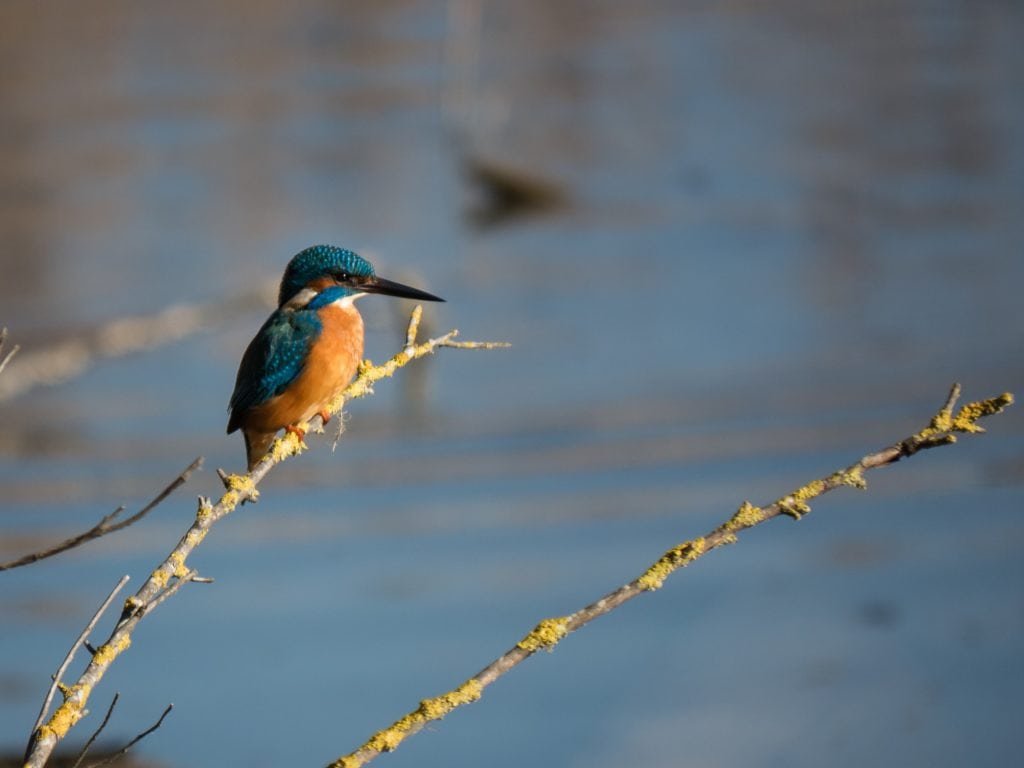
Egyptian Mythology:
Birds were very important to the ancient Egyptians, as evidenced by the fact that several important deities were commonly depicted with bird heads. Kingfishers were a common enough site along the Nile river that they can be found in a number of early Egyptian relief carvings and paintings. They are often depicted defending their young or hovering above the marshlands of the Nile. For the Egyptians, the Nile was the lifeblood of civilization. Marsh birds were extremely important due to their relationship with the Nile. They were associated with the human soul and the afterlife; the mummies of various marsh birds are often recovered within Egyptian tombs. (4)
Japanese Mythology:
In the Japanese fairytale, “The Kingfisher and the Sparrow,” the kingfisher and his brother, the sparrow, live with their father on their farm. The sparrow works hard each day whilst the kingfisher slacks off and enjoys distractions. One day, the kingfisher convinces his brother to go and move to the city with him. They leave their father to serve a powerful lord. There, the sparrow works hard and sends money and letters home to their father. the kingfisher, though, acts lazily and impulsively. He never writes home.
One day, their father writes to the sparrow to tell him that he is old and dying and would like to see his sons one more time. The sparrow informs his brother and immediately sets out for the village. The kingfisher, however, wants to prove that he is important by showing up to the village in the fanciest clothes. By the time he is satisfied with his dress, he is too late. He arrives in the village to find that his father has died. The people of the village scorn his indulgent dress and shame the kingfisher for his selfish nature. So, this is the reason that sparrows are drab and common, while kingfishers are beautiful but hide from view. (5)
Although the kingfisher is not portrayed in the fondest light by this story, kingfishers are actually beloved by many in Japan. Kingfishers are often used to symbolize the natural beauty of Japan’s natural spaces. They are the official birds of a number of Japanese towns.
The incredibly aerodynamic anatomy of the kingfisher even inspired the design of the Japanese Shinkasen bullet train, a high speed train which can travel at speeds of up to two hundred miles per hour. (6)
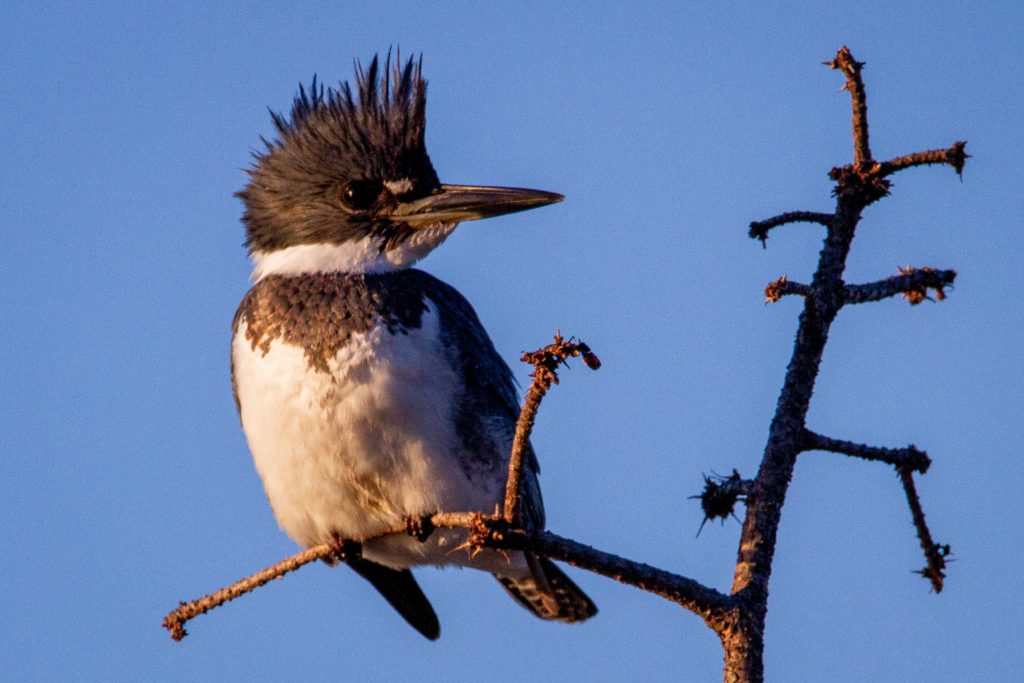
Greek Mythology:
The most significant story in kingfisher mythology is that of Alcyone and the “Halcyon Days.”
Alcyone was the daughter of the Greek god of the winds. She was deeply in love with Ceyx, who was the son of the morning star. The two lovers were so devoted to each other, that even the gods found their love touching. The gods would often watch the lovers in secret admiration for their passion. One day, Alcyone and Ceyx began to refer to each other as “Zeus” and “Hera,” claiming that their love was as strong and beautiful as that of the gods. Although this was a private joke of sorts, unbeknownst to the lovers it was overheard by Zeus who was enraged by their arrogance.
He resolved to punish the couple. When Ceyx visited a fortune-telling oracle, he received the prophecy that he would one day die at sea. Alcyone begged him never to sail, but Ceyx refused and embarked on a sailing expedition despite her pleas. Zeus sent a fearsome storm to fulfill the curse upon Ceyx. With his dying breath, Ceyx begged Poseidon to deliver his body to Alcyone. Meanwhile, Alcyone begged the gods to return Ceyx to her. As she waited on the shore, Ceyx’s body drifted to her. When she found him, her grief and anguish was so absolute and so wrenching that she threw herself into the raging sea alongside him. Seeing this heartfelt act of grief, Zeus took pity on her. He transformed Alcyone and Ceyx into kingfishers.
Although they were now together, Zeus was not content to allow the pair to escape punishment entirely. He insisted that Alcyone must only build her nest at sea, and only in the depths of winter. Alcyone and Ceyx tried, but their eggs were claimed by the crashing waves over and over again. Zeus began to feel pity for Alcyone once again. Unwilling to revoke his punishment, Zeus instead decided to create ten days of perfect weather and a calm still ocean each year. These days became known as the “Halcyon Days” and were the only periods during which Alcyone and Ceyx could safely build their nest. To this day, periods of idyllic calm, warmth, or tranquility are known as “Halcyon Days.” (7)
Halcyon is the Greek word for the kingfisher. This myth is such an important part of humanity’s relationship with these birds that the scientific name for the kingfisher family is “Alcedinidae.” (8) Thanks to this story, kingfishers are often associated with optimism, serenity, nostalgia, good luck, and fair weather.
Kingfisher Spirit Animal
If the kingfisher is your spirit animal then you are most likely an introverted person with a strong pull towards solitude and the outdoors. People with the kingfisher as their spirit animal have excellent attention spans, and can devote hours to studying the things that interest them. They are often most at home in serene natural settings, and prefer their own company over the presence of anyone but the closest of loved ones.
People with the kingfisher spirit animal are incredibly thoughtful. They spend a great deal of time on introspection and they may feel drawn to try and answer life’s biggest questions. It s important that people with this spirit animal learn to trust their instincts and avoid overthinking tings.
Kingfisher Totem Animal
The kingfisher totem animal is associated with precision and practice. People with this totem animal are incredibly dedicated to their craft. They may find that their ambition is their strongest trait. Although natural talent is a blessing, people with the kingfisher totem animal know that practice is the only way to hone a skill.
People with the kingfisher totem may need help remembering that hobbies and skills are worth pursuing just for fun. Being the best at something is a fantastic feeling, but it is not the only thing that makes an activity worthwhile.
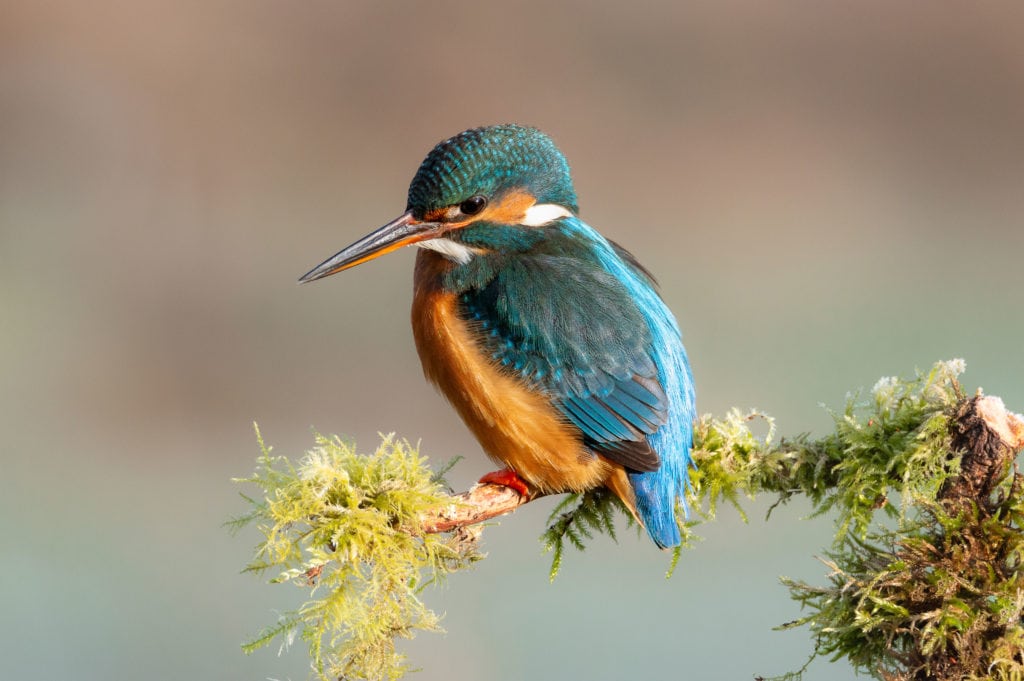
Kingfisher Power Animal
The kingfisher power animal is associated with protection and peace. This power animal brings on the calm “Halcyon Days” that allow us to heal between life’s relentless storms. If the kingfisher is your power animal, look to this bird to guide you through the difficult times by meditating and seeking out peace wherever you can find it. Use your serene nature to guide and protect others when the stormy weather returns.
Kingfisher Tattoo Meaning
A kingfisher tattoo represents nostalgia. It is often chosen to commemorate a beloved period from the past.
Additionally, a kingfisher tattoo may indicate a love for the outdoors, for fishing, or for water. Such a tattoo may also act as a reminder of the virtue of patience.
Conclusion
The story of the “Halcyon Days” demonstrates the virtue of the kingfisher with poetic eloquence. This bird is so serenely beautiful that it seems only natural that humankind would associate it with those magical moments when nature herself breathes a sigh of calm. The kingfisher is, above all, a reminder of how lucky we are to enjoy those special moments.

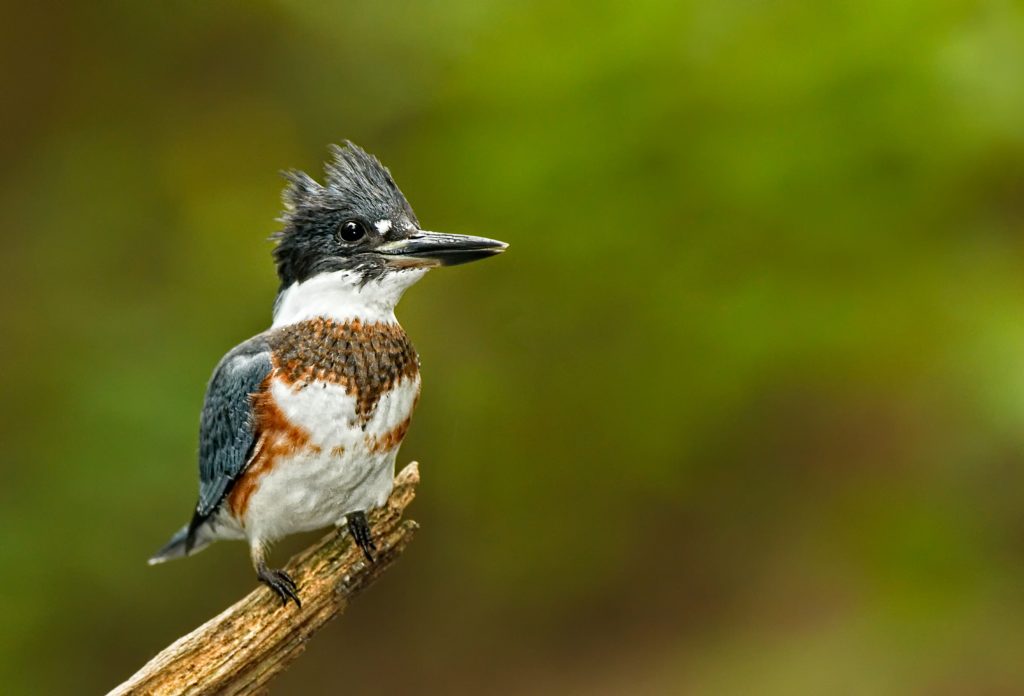
What does it mean when you see 4 kingfishers in 1 hour.
I would think that you are being reminded to be patient and wait for good things to come your way! Thanks for reading!
— Hailey Brophy
Writer @ World Birds
Hi,
I am curious to know a yellow king fisher perched on my window grill in the morning, start looking at objects in my room condo. I was talking to it and left him alone
I thought it flew off and I began to close the window. In the late afternoon, my wife notice the bird in the room with screeching sound and she called me back, as I about to go for my walks.
I returned home to open the window & set it free. it flew off.
Later in the late afternoon, the yellow long beak bird presumably a kingfisher returned at my closed kitchen glass window and it looked at me with its beak open?
I am just wondering what messages the bird is trying to bring? Hopefully luck, prosperity and abundance etc.?
Just trying to solve this mysterious omen?
Note. I can send a photo of the yellow bird if needed?
Kingfishers are definitely good omens, so no worries there! I would consider this to be a sign connected with patience being rewarded!
Hope this helps!
— Hailey Brophy
Writer @ World Birds